While every effort’s been made to ensure this article’s accuracy, it doesn’t constitute legal advice tailored to your individual circumstances. If you act on it, you acknowledge that you do so at your own risk. We can’t assume responsibility and don’t accept liability for any damage or loss which may arise as a result of your reliance upon it.
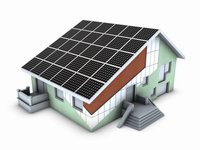
If you can afford a typical £12,000 for your own system, a government scheme could pay you back double that over 25 years. If not, free solar panel systems could cut leccy bills by £70-ish a year. This guide shows the best routes and the top players.
In this guide
Company reviews:
| Tweet | http://mse.me/solar |
The solar panel industry is still new and very fast-moving. Please feedback on how you find this info and if anything needs improving.
What are solar panels?

You put solar panels on the roof to generate energy from the sun. There are two types of panel: solar photovoltaic (PV), which generate electricity and solar thermal, which heat water. This guide focuses on solar PV.
"Hang on, we don't live in California" may be your first thought. Yet solar panels don't need sunshine to work, just daylight, so you can still generate some electricity on gloomy days – important in a country with weather as dull as watching Steve Davis sleep.
PV roof tiles convert the light into electricity, which you can use to power your home during daylight hours. Any energy you don't use is pumped back to the grid. If you use more than the panels generate, the excess comes off the grid, exactly as it did before the panels were fitted.
In the winter, when solar power is less, you'll take more power from the grid. It's a good idea to set appliances to run while it's light outside, staggering them to max the savings. For tons more top tips from solar nerds, read the forum's Make the most of solar panels thread.
What's in it for you?
First get away from the idea that this is purely about going green – done right, solar panels can generate £1,000s in cash savings. You save in two ways:
- Electricity bill savings. The Energy Saving Trust (EST) estimates that a typical family can knock around £70-ish/year off their bills with a typical 2.7 kWp system, depending on system size, location, whether you're at home during the day and other factors.
EST used to predict higher electricity savings of £120. Yet its recent research found, while solar panels can produce 50% of a home's electricity, most of this electricity gets pumped back to the grid. Over five to 25 years energy prices are predicted to rise significantly; if so, you'll save more. - Feed-in tariff payments. Back in 2010 the Government ditched grants for solar panels and replaced them with a generous scheme that pays for all the solar energy you produce, even if you use it yourself. The amount you earn depends on your system's size, but a typical payment could be £1,030/year (do your sums first).
Bizarrely, the earnings from this scheme massively eclipse the electricity bill savings.
Who are they suitable for?
You usually need a roof which faces within 90 degrees of south, with little shade from buildings or trees. While some early or late shading is okay, the roof should be unshaded between 10am and 4pm.
Of course, northern homes get slightly less sun, yet solar panels are still worth it in most areas. Ideally you'd also be planning to stay in your house for a number of years. Call your local Energy Saving Trust Advice Centre on 0800 512 012 for more advice on whether solar panels are for you.
Should you pay or get 'em free?
When it comes to installing, you've two options: get solar panels fitted for nowt or, if you can stump up a typical £12,000, buy your own system and get payments from a government scheme.
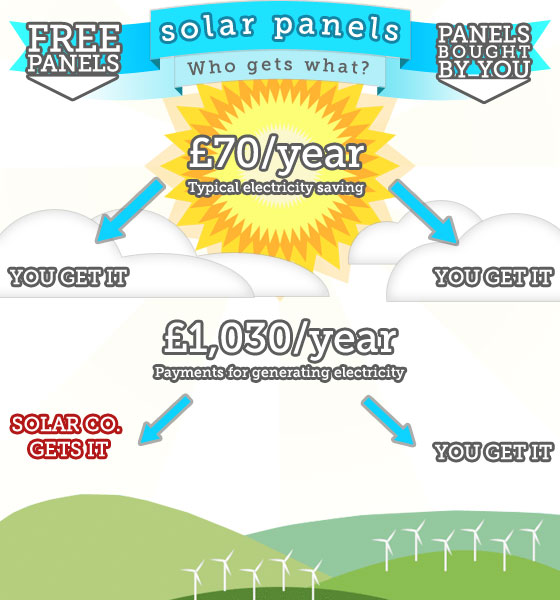
FREE systems: Pros & Cons
- Free electricity. You could typically slice your electricity bill by £70-ish/year – more if you're at home during daylight hours or prices jump significantly, which they could well do over 25 years.
- Try free then buy. One solar panel scheme, E.on, allows you to buy the solar panels at a reasonable price later on, meaning you could decide later to pump in the cash and keep the feed-in payments.
- Make your home greener. Free solar panels let you make a contribution to reducing your home's carbon footprint, without stumping up your own cash. But not everyone's convinced about solar panels' benefits – see George Monbiot's Guardian blog.
- Free maintenance. Usually the free solar panel company maintains the panels and pays for insurance (always check your contract).
- They keep the feed-in tariff
The free solar panel company keeps the feed-in tariff, typically £1,030-ish year. If you've spare cash, you may be better off paying for your own system. Yet if you don't have spare cash for panels, you wouldn't been able to get this anyway. - Buyout fees
This is best for those settled in their forever home. While some providers have reasonable buyout fees, with others, it's cheaper to buy out Lionel Messi.
- Potential buyers may be wary
Do bear in mind a leased roof could ring alarm bells for prospective buyers. Richard Webster of Richard Webster & Co Solicitors says: "I can't see any real problems for the average buyer with the free panels scheme, other than the look of the house, if that's a concern.
"Most people will appreciate even a small saving on electricity costs. Of course, there is always the chance that some buyers may worry; being tied to some third party in a contractual situation, however harmless, could frighten some." - Roof repairs could be costly
Free solar panel companies usually fix your roof if it's damaged by the panels. But if you want to fix your roof for a reason not connected to solar panels, free solar panel companies sometimes make you cover their feed-in payments in the meantime (always check).
Full info in the free solar panels section.
Buying your own system: Pros & Cons
- You keep the feed-in payments. As an example, a £12,000 system could net you £25,750 over 25 years, though it totally depends on system size, location, sunshine etc.
- You save on electricity. On top of this, you could typically slice your electricity bill by £70/year – more if prices rise.
- It could tempt would-be buyers. Buyers may be attracted by the electricity savings and feed-in payments. Though others may be put off by the look of the things, so do ask local estate agents for their experiences.
- The Government could end/change it early. The Government says the feed-in scheme will run for 25 years, but it can do anything it wants. There's nothing to stop future governments ditching it – the Government can say it owns France if it wants to.
The truth is retrospective legislation is very rare, and few parties ever support it. Most likely they'll change the scheme for new subscribers only, but anything's possible.
- You will have to pay for upkeep. The Energy Savings Trust says little maintenance is required on a properly installed, well
designed solar PV system, though you'll likely need to replace the inverter within 25 years (c. £1,000). Of course, though, anything could go wrong.
You also need to check your home insurance covers the system and add it if not.
Full info in the buying solar panels section.
Route 1. Buy your own panels
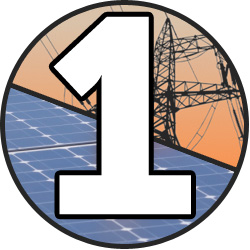 If you've £8,000 to £14,000 knocking about, you could get back more than double that in payments for the energy you produce. Some firms will also let you buy solar panels on credit. However, if you don't have the cash up front, panels aren't for you. The interest on the loan could dwarf the savings.
If you've £8,000 to £14,000 knocking about, you could get back more than double that in payments for the energy you produce. Some firms will also let you buy solar panels on credit. However, if you don't have the cash up front, panels aren't for you. The interest on the loan could dwarf the savings.
This is all about the Government's feed-in tariff (Fit) scheme, which means electricity companies must pay people who produce electricity from renewable energy sources such as wind or the sun.
The Energy Savings Trust (EST) says a typical £12,000 2.7 kWp (kilowatts peak, the rate it generates electricity on a sunny day) system could earn £1,030/year in payments. It's not guaranteed and depends on system size, location etc. Yet the key to this is:
A typical system could cost c.£12,000, but over 25 years the feed-in payments could net you £25,750.
The Government says the feed-in tariff payment for solar panels will run for 25 years and will rise with inflation (linked to the Retail Price Index). It's also tax-free.
EST predicts feed-in tariffs are "likely to be significantly reduced for systems installed after 1 April 2012". So if the sums do add up for you, you may want to act quickly.
How feed-in works
Households with approved solar panel schemes are paid for the electricity they generate, even if they use all of it themselves. These payments are in addition to bill savings.
For techies, the feed-in tariff pays you up to 43.3p per kWh (kilowatt-hour, one unit of electricity) for energy generated from solar panels. Then there's a 3.1p bonus for every unit you don't use and pump back (export) to the grid. That's considerably more than the typical 13p per unit it costs to buy electricity from your provider.
Plug your details into the Energy Saving Trust's (EST) feed-in tariff calculator to see how much you'll gain (this has not yet been tweaked to reflect EST's latest research on electricity savings, but gives an idea). Go to Ofgem for a full list of feed-in tariffs. The feed-in scheme covers England, Scotland and Wales, but not Northern Ireland.
Here's an example of what a typical domestic 2.7 kWp solar electricity system could earn:
| Savings per year | |
|---|---|
| Generation tariff | £990 |
| Export tariff | £40 |
| Electricity bill savings |
£70 |
| Total/year |
£1,100 |
| Source: The Energy Savings Trust. Based on a tariff rate of 43.3p/kWh, export rate of 3.1p/kWh and assumes 75% of the electricity generated is exported. | |
If your energy supplier doesn't hook you up with an import/export meter, it assumes you pump 50% of electricity back to the grid. (Your electricity bill savings will depend on how much you actually export, usually over 50%.) The vast majority of energy suppliers don't currently supply meters, because of the cost, plus the Government is still deciding meters' requirements.
Will the scheme definitely last for 25 years?
The feed-in tariff is under government review, with results expected late 2011. Any changes should not affect those who signed up for solar panels before they were announced. Philippa Heap, senior press officer for the Department of Energy and Climate Change, confirmed "there will be no retrospective changes". Though remember ...
25 years is a long time – there's nothing to stop future governments changing feed-in tariffs. Though it's very unlikely for existing users.
How to pick a fitter
To get the feed-in tariff, both the system and the installer should be members of the Microgeneration Certification Scheme (MCS).
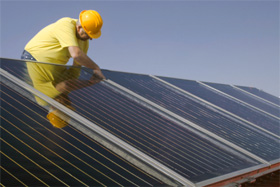 As we're MoneySavers not electricians, picking installers isn't our speciality so instead here are the results of the British Renewable Energy Awards 2011, run by the Renewable Energy Association.
As we're MoneySavers not electricians, picking installers isn't our speciality so instead here are the results of the British Renewable Energy Awards 2011, run by the Renewable Energy Association.
EvoEnergy was best installer (forumites also give it decent reviews). Shortlisted were Beba Energy, Ecovolt, Photon Energy, The Greener Alternative and Solarsense.
As always, get at least three quotes before signing up and get 'em in writing. When comparing quotes, check the following is included: scaffolding; removal of the existing roof and other roofing works; internal wiring works; connection agreement with the energy supplier; electrical connection work; and a generation meter.
Also scout for details of discounted schemes in the Energy Grant Grabbing guide. Finally, ensure the installer is a member of the Renewable Energy Assurance Limited (Real) scheme. Plus you've seven days to cancel after you sign up to buy.
Finally, never borrow from solar companies to pay for panels. Some installers let you buy solar panels on credit. If you don't have the cash up front, paid-for panels aren't for you. The loan's interest could dwarf the savings.
Ensure you shop safely
While MoneySavingExpert.com endeavours to check deals are valid, we don't check companies' finances - even huge names like MFI and Woolies have folded - so it's very important you use the right strategies to stay protected where possible.
Pay by credit card for something over £100, eg, flights, kitchens, sofas, and Section 75 laws super-charge your consumer rights. Unlike debit cards, cheques and cash, pay in full or part (even just £1) on a credit card and by law the lender's jointly liable with the retailer.
This means you have exactly the same rights with the card company as you do with the retailer, so if it goes bust, you can simply take your complaints there instead and get money back if no delivery. See the Section 75 guide for a full explanation.
 Solar panel sellers:
Solar panel sellers:
A Which? investigation
A Which? magazine investigation showed many solar companies are using dodgy sales tactics and giving poor advice to people looking to buy solar PV panels.
In an undercover investigation, the magazine found three quarters of companies overestimated how much energy the solar PV panels would produce and most of them underestimated how long it would take for the system to pay for itself. Read a {full rundown}.
Posing as customers, Which? asked several companies to survey a house in southern England and quote for installing a solar PV system (see chart).
Seven out of the 12 salespeople visiting the Which? undercover house even recommended installing solar PV panels on a shaded part of the roof and eight companies didn’t question customers about how much energy they used.
The companies highlighted in purple overestimated the annual output of energy from the PV system, and therefore underestimated the payback time. (Though Which? says this is because the way MCS members are supposed to calculate the payback time under government regulations is flawed, as it takes no account of where you live in the UK.)
Provider |
System size (kWp) |
Price quoted |
Final price incl discount
|
|---|---|---|---|
| Anglian |
1.11
|
£11,000
|
£11,000
|
| Sainsbury's (Brit Gas) |
1.26
|
£7,149
|
£7,149
|
| Igen (House Choice) |
1.35
|
N/A
|
£10,000
|
| Evo Energy | 1.48 |
£7,095 |
£7,095 |
| Skyline Solar | 1.50 |
£11,156 |
£10,238 |
| Solar PV Power | 1.50 |
£7,500 |
£6,975 |
| Npower (Ecofirst) | 1.62 |
£7,943 |
£7,506 |
| Green Home Company | 1.84 |
£8,103 |
£8,103 |
| Green Sun | 1.90 |
£10,942 |
£9,563 |
| Freesource Energy | 1.96 |
£9,919 |
£9,919 |
| Solar 4 us | 4.00 |
£15,599 |
£15,599 |
| Homebase (Eon) (1) | N/A |
N/A |
N/A |
| Companies in brackets are subcontractors working on behalf of the company. kWp = kiloWatt peak, or the maximum amount of energy you can generate. Prices quoted inclusive of VAT . 1) Did not send a quote despite being chased. | |||
Route 2. Get 'em free
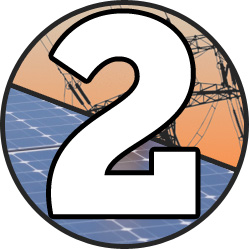 If you're in England, Wales or, in a few cases, Scotland, panel firms will fit a state-of-the-art system to your home for free, possibly cutting your leccy bill by £70 a year.
If you're in England, Wales or, in a few cases, Scotland, panel firms will fit a state-of-the-art system to your home for free, possibly cutting your leccy bill by £70 a year.
Why do they do this?
Normally the homeowner grabs the big-money feed-in cash, but, in return for the free solar panels, they keep this. So you get cheaper leccy bills, they get the payments.
The £1,000s in feed-in payments dwarf the electricity savings, so if you do have the cash, consider buying the panels outright.
Watch to watch out for with free solar panels
This is a relatively new industry. Your home is your most valuable asset, so think very carefully about what it means to sign up for a 25-year commitment. Don't read this as a 'don't do it', instead a 'be prepared that if you do, it may not be plain sailing'. Read these points to bear in mind
- Ask the right questions
Are you really sure it's for you? Read Consumer Focus's list of questions to ask before you apply and get the contract checked by a solicitor. Plus have a butchers at the Real Assurance Scheme's (set up by the Renewable Energy Association) list of info the free panel company should give you. - Check with your mortgage provider
Solar leases do vary, so officially mortgage providers treat each one on a case-by-case basis. Yet we asked several of the big lenders and they said they were usually happy with the leases in principle, as long as the buildings insurer is informed and you have planning permission (always check with your lender).
Mortgage companies may charge an admin fee to grant consent for a free-solar-panel lease.
The free solar panel companies
Here's a comparison of the UK's biggest free solar panel companies. What happens will also depend what's in your contact, so do read carefully before signing, preferably seeking legal advice.
The solar panel companies say that the buyout fees they gave us are fixed, although, of course, they vary according to system size. Yet always ask it to include a schedule of these fees in your contact, and confirm the charges will not rise.
This is a relatively new scheme, so while we have info from the providers, what we don't have is much feedback from MoneySavers who've been through it. Please add your feedback to the companies' threads if you sign up.
E.on Strong pick, as effectively 'try free then buy'
- Where: England and Wales
- Typical buyout fee (yr 13): £7,806
- Roof requirements: E.on customers with south-facing roofs of 23m2 plus
- Lease length: 25 years
- Feedback: E.on
E.on's a strong contender, as it's a big company, so far from a fly-by-night player. Plus it lets you try then buy, as you can sign up for £99 panels, then pay a reasonable sum later to buy them and start earning the feed-in tariff.
The only drawback is you must be an E.on customer to sign up, but with a transaction this big, the chance of solar gains likely outweigh any possible extra pounds on energy (you can always switch away once done).
An established player in the energy field, E.on charges reasonable fees if you want to buy the system later and grab the feed-in payments. It effectively lets you try free then buy.
Who is eligible?
E.on currently installs across England & Wales, but plans to launch in Scotland later this year. Your roof should roughly face south and be more than 23 square metres. See a full list of eligibility criteria.
To sign up, you must be an E.on customer and not on a pre-payment meter. Yet you just need to be with E.on for either electricity or gas, and are free to switch away after it fits the panels. Counter to our usual Cheap Gas & Electricity system, for a transaction of this size it could be worth switching to E.on for (see step-by-step guide).
How much to buy the panels?
E.on boasts the lowest charges to buy out the panels of the free providers (see our fees chart and E.on's schedule of buyout fees).
If you're serious about solar, do get some quotes from installers and compare them with E.on's buyout charges. If E.on's are much higher, consider buying outright in the first place.
Anything to pay?
There's a £99 sign-up fee, which you only pay after E.on's surveyed your home and you decide to go ahead. If you've an extension, conservatory or three-storey property, it charges £210 to erect non-standard scaffolding.
How to sign up
If you're already an E.on customer for gas or electricity, skip these steps and simply fill in its application form. If you're not ...
Step 1. Check you're eligible. First carefully check you meet its criteria.
Step 2. Switch to E.on. If your home's a runner, consider switching either your gas or electricity to E.on. (Read Cheap Gas & Electricity for a full switching guide, including how to get up to £40 cashback on top.)
Do bear in mind switching doesn't mean you'll be accepted onto the scheme. E.on says one in 10 applications results in a successful installation (though folk drop out of their own accord).
Step 3. Apply. Once you're an E.on customer, fill in its free solar application form.
Step 4. Find out if you're accepted. If rejected, compare Gas & Electricity providers and switch if E.on's not cheapest (though it could be). If you're accepted, wait until the panels are installed and, again, switch if E.on's not top.
If you tried this, please feedback on the process and if you were accepted.
British GasYou don't need to be with BG & includes Scotland
- Where: England, Scotland and Wales
- Typical buyout fee (yr 13): £14,500
- Roof requirements: Pitched, un-shaded roof, facing south east to south west
- Lease length: 25 years
- Feedback: British Gas
It's an established player in the industry, and you don't need to be a British Gas customer. The downside's it charges more than E.on to take over the panels.
Who is eligible?
Your roof should be pitched, un-shaded, and face south east to south west. Unlike other free solar companies, British Gas covers Scotland. There may be extra costs if the property is more than two stories or has roof access problems.
How much to buy it out?
The cost depends on how much time is left on the 25 year contract, as it calculates lost income from the Fit up to the 25 year end (see chart). A schedule of buyout values for each year of the lease is provided with the lease.
A Shade GreenerGood for northerners
- Where: Parts of northern England & the Midlands
- Typical buyout fee (yr 13): You can't buy out
- Roof requirements: Roof must usually be 24m2 & due south or within 70 degrees of south
- Lease length: 25 years
- Feedback: A Shade Greener
A Shade Greener concentrates on the North of England and has decent feedback from forumites, though you can't buy the panels out.
If you live in the North of England, established free solar panel player A Shade Greener is well worth a look. It has some fab feedback from forumites and there are no charges at all, ie, even if you need non-standard scaffolding. Though once you sign up, you can never buy out the panels.
Who is eligible?
A Shade Greener covers parts of Yorkshire, Nottinghamshire, Derbyshire, Lincolnshire and what used to be Humberside. Generally, you must be within a one hour drive of the postcode S75 3DP, but it will stretch further if you're in Derbyshire or Nottinghamshire and are easily accessible from the motorway.
It also installs in Leicestershire in the following postcodes: LE1, LE2, LE3, LE4, LE5, LE6, LE8, LE9, LE10, LE11, LE12, LE67, LE65.
Watch to watch out for
Unlike other companies, there's no option to pay a fee to buy out the contract. So only consider this if you're in it for the long haul.
EvoEnergyStrong feedback for installing (new to free systems)
- Where: South of Northampton
- Typical buyout fee (yr 13): £12,820
- Roof requirements: Roof of 23m2, facing south east to south west, no shading
- Lease length: 25 years
- Feedback: EvoEnergy
Though new to the freebie panel market, EvoEnergy is an established solar panel fitter.
While a newcomer to the free solar panel market, EvoEnergy's an established solar panel fitter, and won the Renewable Energy Association's 2011 installer of the year.
It says it's 100% free and doesn't charge for scaffolding or installation. Its buy-out fees are not hideous, but are still pricier than E.on's.
Who is eligible?
Anyone south of Northamptonshire. Roof requirements depend on where you are in the country, but it currently concentrates on roofs facing south-east/south west at a maximum pitch of around 45 degrees to the horizontal.
HomeSun
- Where: Everywhere south of Hull including Wales
- Typical buyout fee (yr 13): £15,000
- Roof requirements : 20m2 of clear, unshaded space and the roof can't be too flat or steep
- Lease length: 25 years
- Feedback: HomeSun
HomeSun is an established free solar installer, but its buyout charges are on the high side.
Free solar panel firm HomeSun installs everywhere south of Hull, including Wales.
Who is eligible?
You need 20 square metres of clear, unshaded space and the roof can't be too flat or steep. The roof must also orientate a certain way, which changes according to location. Use its tool to check if your home is a contender.
How much to buy out?
The cost depends on system size value and, like others, the value depreciates over 25 years. It's fees to buyout the system are on the high side; do ask it to break down examples for you when you sign up. (See chart.)
Check others before signing up to 'SolarShare'
HomeSun also offers another product called SolarShare. This is when it's expensive for HomeSun to put the solar panels on, eg, there's a lot of scaffolding or you've a slate roof, which is harder to fix solar panels to. This to pay an initial fee of £100 to £500 sign up.
SolarShare is not such good a deal. Check out the free solar panel companies first and if they will add an extra charge, plus ensure you'll save enough in electricity to recoup the cash.
ISIS Solar
- Lease length? 26 years
- Typical buyout fee (yr 13): £15,700
- Roof requirements: Pitched, unshaded roof of 25m2 or more
- Areas covered? All England and Wales
- Feedback: Isis
Isis installs in England and Wales and gives £100 M&S; to new recruits.
Currently installing in England and Wales, Isis is scheduled to launch a limited scheme in Scotland later this year. Do note that its lease is 26 years, rather than the usual 25.
Who is eligible?
You'll need a pitched, unshaded roof of 25m2 or more, and it must be orientated between 230 and 130 degrees. If your property is tricky to scaffold on, there's a £175 fee.
If you want to takeover the panels, buyout fees are on the high side (see chart). Always ask for a buyout fees breakdown before signing up.
Free £100 M&S; vouchers
ISIS is giving away £100 of M&S; vouchers when you get panels installed. To claim, quote ‘M&S; offer’ by email, phone, or at any point during the installation process. The offer is limited to the first 1,000.
However, for a transaction of this size, don't be led by the M&S; vouchers. Think of it as an added bonus if you already want to sign up with Isis.
Solar panels: key warnings
There are some important checks to do before you buy panels or sign up for freebies ...
- Check if you need planning permission

You don't generally need planning permission for solar systems. The big exceptions are if you've a flat roof, the property is listed, or it's a conservation area.
You might need to get approval from your council's building control team though. Check with your local authority. If you get a free system, your provider will normally do this for you (always check). - Tell your mortgage provider and insurer
As with any home improvement, you should contact your insurer and mortgage provider. If you go for the free option, check that the company will liaise with lenders and insurers. - What if the solar company went bust?
If the free solar panel firm went bust, it's likely the panels would stay on and be maintained. The rights to collect your feed-in tariff would be creditors' biggest asset, so chances are they'd sell this right on to another company.
Yet this is a totally new business model, and things could change if the Government withdrew the feed-in scheme, so it's impossible to predict all eventualities.
If you bought solar panels and the fitter went bust, you would need to find someone else to maintain them, yet this wouldn't be so much of an issue. - Converting your loft could be tricky
If you're planning to convert your loft, ask the installer if you'll still be able to. For example, sometimes inverter equipment is stored in the loft, meaning less space.
Here's a list of other commonly asked questions:
What happens if I sell my house?
Hopefully potential buyers will be pleased about the electricity savings and, if you paid for the system, the potential feed-in tariff profit. Yet there is always the chance that they won't like the look of them – it's worth asking local estate agents for their experiences.
The Energy Savings Trust has written a report about how renewable energy affects house prices; download the PDF.
Can I keep/change electricity providers?
Yes. You're not tied to any electricity provider; the feed-in tariff is a universal arrangement that Ofgem runs across all providers.
Do you have to own the house?
You probably wouldn't want to pay £12,000 for a new system if you didn't own your home.
If you are living in rented accommodation (including Local Authority), you can take advantage of the free schemes. You would need the permission and co-operation of the landlord or freeholder who owns the roof.
Who pays for the feed-in tariffs?
Electricity suppliers fund the payments. It's generally accepted that they will pass costs on to customers.
Don't miss out on updates to this guide Get MoneySavingExpert's free, spam-free weekly email full of guides & loopholes
Home wind turbines
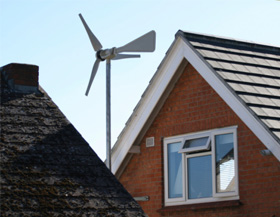
For those in uber-blustery locations, wind turbines are another option. They're suitable for fewer people than solar panels, but if you do have the right wind speed, the potential savings could blow you away.
The turbines work in windy, exposed locations, not too close to buildings. It sounds like something that diagnoses flatulence problems, but the Energy Saving Trust's wind speed tool tells you if your area has the required 5 metres per second.
Unlike solar panels, you nearly always need to get planning permission and they sometimes make a noise. Do be aware there is debate over how effective wind turbines on urban homes are - most people who install wind turbines have land and aren't too close to neighbours.
How much can you save?
Wind turbines are pricier than solar panels: you're looking at between £15,000 and £23,000 – sometimes even up to £50,000 for the bigger models.
Savings vary greatly depending on the wind speed and the size of your system but could be up to £300 a year.
As with solar panels, for every watt you generate you are paid a guaranteed sum – on smaller systems this adds up to 36.2p per kWh generated. For bigger wind turbines systems it's 28p per kWh generated. You then get an extra 3.1p for every kWh you export back to the grid, on top of money given for generation. See a full list of tariffs.
Both your installer and wind turbine must be registered with the Microgeneration Certification Scheme (MCS) to get the feed-in tariff.
Again, how much you can make varies dramatically according to wind speed and turbine size. In the right location you can earn between £500 and £10,000 a year. Use the Energy Savings Trust's cashback calculator to check how much feed-in you could get.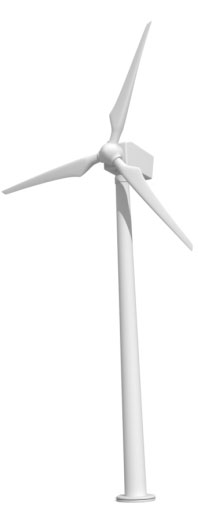
Can you get free wind turbines?
There aren't any residential free wind turbine schemes as yet. One company, SolarVentus, runs a scheme, but it's aimed at landowners, farmers and industrial users rather than domestic properties.
We've heard there could be one in the pipeline though - all updates will go in the free weekly email.
Anything else to watch out for?
To grab the feed-in payments, you will need to be connected to the national grid. Your installer will be able to work out whether the site is suitable and where the cables will go.
The turbines have moving parts and will need maintenance. Do check with your installer how the warranty works and who's responsible for getting them fixed.
This is a serious undertaking and a big expense. Before installation do your research and treble check wind speeds.
Crucial tips to save £100s on energy bills
Obviously there's absolutely no point at all in installing a swanky solar panel system if you haven't tried other ways to save first. Here are our top tips:
-
Switch energy
 Switching energy is easy: nothing changes other than who bills you. If you've never switched before you can save £200+/year. While the cheapest online deals for typical users are around £900 a year, those on a standard tariff typically pay around £1,150.
Switching energy is easy: nothing changes other than who bills you. If you've never switched before you can save £200+/year. While the cheapest online deals for typical users are around £900 a year, those on a standard tariff typically pay around £1,150.
For full info on the top comparison sites and how to get extra cashback, a crate of wine or Amazon vouchers see the full Cheap Gas & Elec guide. -
Pay by monthly direct debit
Set up a monthly direct debit to pay your bill and you'll usually save around 5-10% extra yet it's crucial to make sure the energy company doesn't set it too low or too high. Either the supplier keeps hold of your cash unnecessarily or you end up with a big bill at the end of the year. Full details in the Energy Direct Debits guide.
-
Do a meter reading regularly
Every time you receive a bill, do a meter reading. Don't rely on your energy provider's estimate; these are often way out. If they're under-billing, you'll have a big whack to pay at the end of the year. If they're over-billing, then they've unfairly got your cash.If your Direct Debit is way off kilter, call up and request it's changed. You have a range of rights to ensure it's correct. See the full Energy Direct Debits guide for template letters to help.
-
Switch to an internet tariff
Switch to your company's internet billing. It will usually save you up to 10% over the standard tariff, and all it really means is you get your bills emailed.
-
Grab £1,000s of grants
There's a vast range of grants available for improving home heating and insulation. Just go to the Energy Saving Trust's Energy grant search. For more grants available for all types of home improvement, see the full Grant Grabbing guide.
| Tweet | http://mse.me/solar |
The solar panel industry is still new and very fast-moving. Please feedback on how you find this info and if anything needs improving.
Ask A Question/Forum Discussion
Free Solar Panels Discussion
Spotted out of date info/broken links?
Email brokenlink@moneysavingexpert.com to let us know
Always double check the product details before signing up to them

LINKS THAT HELP THIS SITE (all have a * in above article)
(this has no impact on product or pick - see explanation below)
N/a
Explanation (of * links)
LINKS THAT DON'T HELP THIS SITE
(please only use if necessary)
No * Link Available: A Shade Greener , A Shade Greener , Beba , British Gas , Decc , Ecovolt , Energy Saving Trust , Eon , Evo Energy , EvoEnergy , HomeSun , Isis , MCS , Microgeneration Certification Scheme , Ofgem , Photon , Rea , Renewable Energy Assurance Limited , Solarsense , SolarVentus , The Greener Alternative , Which?
Duplicate links of the * links above for the sake of transparency, but this version doesn't help MoneySavingExpert.com:
N/a



























